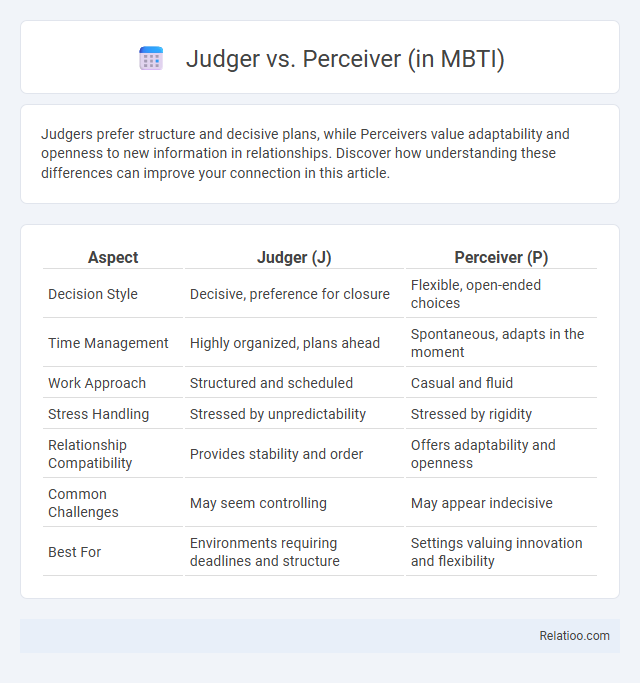Judgers prefer structure and decisive plans, while Perceivers value adaptability and openness to new information in relationships. Discover how understanding these differences can improve your connection in this article.
Table of Comparison
| Aspect | Judger (J) | Perceiver (P) |
|---|---|---|
| Decision Style | Decisive, preference for closure | Flexible, open-ended choices |
| Time Management | Highly organized, plans ahead | Spontaneous, adapts in the moment |
| Work Approach | Structured and scheduled | Casual and fluid |
| Stress Handling | Stressed by unpredictability | Stressed by rigidity |
| Relationship Compatibility | Provides stability and order | Offers adaptability and openness |
| Common Challenges | May seem controlling | May appear indecisive |
| Best For | Environments requiring deadlines and structure | Settings valuing innovation and flexibility |
Understanding Judgers and Perceivers in MBTI
Judgers in MBTI prefer structure, organization, and clear decisions, often feeling stressed by uncertainty and last-minute changes, while Perceivers thrive on flexibility, adaptability, and keeping options open, which can lead to conflicts when routines clash. Understanding your preference as a Judger or Perceiver helps identify triggers such as impatience for Judgers when plans are disrupted or frustration for Perceivers when pressured to finalize decisions prematurely. Recognizing these differences promotes better communication and reduces conflict in both personal and professional relationships.
Core Characteristics of Judgers
Judgers in the MBTI framework exhibit a preference for structure, organization, and decisive planning, often seeking closure and clear goals to maintain control over their environment. Your natural inclination toward order and predictability can trigger conflicts with Perceivers, who thrive on flexibility and spontaneity. Understanding these core characteristics helps mitigate misunderstandings by recognizing Judgers' need for reliable schedules and timely decisions.
Key Traits of Perceivers
Perceivers in the MBTI framework prioritize adaptability, open-mindedness, and spontaneity, often preferring to keep options open rather than committing prematurely, which contrasts with the Judger's preference for structure and decisiveness. This fundamental difference triggers conflict when Judgers perceive Perceivers as indecisive or unreliable, while Perceivers view Judgers as rigid or controlling. Understanding these key traits--flexibility, curiosity, and a preference for exploration--helps mitigate misunderstandings in Judger-Perceiver interactions.
Decision-Making Styles: Judger vs Perceiver
Judgers in MBTI prefer structured, planned decision-making, relying on clear conclusions and definite timelines that provide predictability and control. Perceivers favor flexibility and spontaneity, keeping options open to adapt decisions according to new information or changing circumstances. Your decision-making style may trigger conflicts when Judgers perceive Perceivers as indecisive, while Perceivers view Judgers as rigid or overly controlling.
Approaches to Structure and Flexibility
Judgers (J) prefer structured, planned environments and rely on order and decisiveness to manage tasks, while Perceivers (P) thrive in flexible, adaptable settings that allow spontaneity and open-ended exploration. This fundamental difference in approach to structure versus flexibility often triggers conflict, as Judgers may view Perceivers as disorganized or unreliable, and Perceivers may perceive Judgers as rigid or controlling. Understanding these cognitive preferences can help mitigate misunderstandings and enhance collaboration in personal and professional contexts.
Time Management: Planned vs Spontaneous
Judgers (J) prefer structured time management with planned schedules and clear deadlines, leading to smoother workflow and reduced stress. Perceivers (P) thrive in flexible, spontaneous environments, often adapting last-minute but risking procrastination and time conflicts. Conflict triggers arise when Judgers' need for order clashes with Perceivers' improvisational style, causing tension in joint projects or shared responsibilities.
Judger and Perceiver Communication Styles
Judgers in MBTI prefer structured, decisive communication with clear plans and closure, often seeking to resolve conflicts quickly through direct and organized dialogue. Perceivers favor flexible, open-ended conversations, encouraging exploration and adaptability, which can lead to misunderstandings when Judgers perceive this as indecisiveness or procrastination. Conflict arises as Judgers push for resolution and order, while Perceivers resist pressure, valuing spontaneity and ongoing options during discussions.
Strengths and Challenges of Each Type
Judgers excel in organization, decisiveness, and goal orientation, providing structure that ensures tasks are completed efficiently, but their preference for closure can trigger conflict when flexibility is needed. Perceivers thrive in adaptability, open-mindedness, and spontaneity, fostering creativity and new experiences, yet they may struggle with deadlines and consistent planning, which can frustrate Judgers. Understanding Your natural tendencies helps manage potential friction by balancing Judger decisiveness with Perceiver flexibility, optimizing teamwork and personal growth.
Judger-Perceiver Dynamics in Relationships
Judger-Perceiver dynamics in relationships often trigger conflict due to fundamental differences in approach to structure and spontaneity; Judgers prefer organized, planned environments, while Perceivers thrive on flexibility and adaptability. These opposing preferences can cause tension when Judgers perceive Perceivers as indecisive or inconsistent, and Perceivers view Judgers as rigid or controlling. Effective communication and mutual respect for each other's cognitive styles are essential to balance order and spontaneity for a harmonious partnership.
Tips for Harmonizing Judger and Perceiver Differences
Judgers prefer structure and decisiveness, while Perceivers value flexibility and spontaneity, often triggering conflicts related to planning and deadlines. To harmonize Judger and Perceiver differences, you can establish clear communication by setting mutually agreed-upon boundaries and deadlines without rigid enforcement. Encouraging empathy and understanding each other's working styles fosters collaboration, turning potential conflicts into opportunities for growth.

Infographic: Judger vs Perceiver (in MBTI)
 relatioo.com
relatioo.com